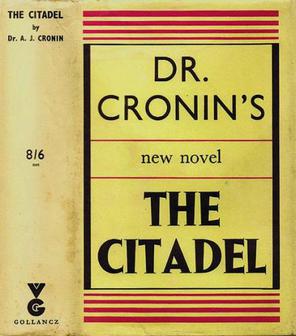The Citadel (novel)
The Citadel is a novel written by A.J. Cronin, first published in 1937. The book is set in the 1920s and tells the story of a young Scottish doctor, Andrew Manson, who starts his career in a small Welsh mining town. The novel explores themes of social injustice, the ethics of medical practice, and the challenges and corruption within the British medical system of the time.
Plot Summary[edit | edit source]
The story begins with Manson's arrival in the mining town of Drineffy, where he quickly encounters the harsh realities of medical practice among the impoverished coal miners. He is dedicated to his work, often clashing with local customs and the established medical practices. His efforts to improve the health conditions lead to significant improvements, but not without personal cost.
Manson eventually moves to London, seeking to further his career and make a more substantial impact. However, he becomes disillusioned with the medical profession's focus on profit over patient care. The narrative follows his moral and ethical struggles as he navigates the complexities of the medical field, his personal life, and his desire to maintain his integrity.
Themes and Analysis[edit | edit source]
The Citadel is notable for its critical view of the medical profession and its exploration of ethical dilemmas faced by doctors. Cronin, who was a physician before becoming a writer, drew on his own experiences to depict the challenges of medical practice and the impact of socioeconomic factors on health. The novel advocates for a more humane and ethical approach to medicine, highlighting the need for reform in the healthcare system.
The book also delves into the personal growth of its protagonist, examining how his experiences and the injustices he witnesses shape his character and professional outlook. Manson's journey is one of idealism confronted by reality, a theme that resonates with readers even today.
Impact[edit | edit source]
Upon its release, The Citadel received critical acclaim and was a commercial success. It is credited with influencing the establishment of the National Health Service (NHS) in the United Kingdom by bringing to light the disparities and inefficiencies in the healthcare system. The novel sparked discussions on the need for a unified healthcare system that would be accessible to all citizens, regardless of their economic status.
Adaptations[edit | edit source]
The Citadel has been adapted into several films and television series, further extending its impact and reach. The most notable adaptation is the 1938 film directed by King Vidor, which starred Robert Donat and Rosalind Russell. The story's themes and its critique of the medical profession have made it a timeless piece, relevant to discussions about healthcare ethics and reform.
Legacy[edit | edit source]
Today, The Citadel remains a significant work in the canon of British literature, particularly for its contribution to discussions about medical ethics and healthcare reform. It continues to be studied for its social commentary and its portrayal of the challenges faced by medical professionals.
This article is a literature-related stub. You can help WikiMD by expanding it!
Search WikiMD
Ad.Tired of being Overweight? Try W8MD's physician weight loss program.
Semaglutide (Ozempic / Wegovy and Tirzepatide (Mounjaro / Zepbound) available.
Advertise on WikiMD
|
WikiMD's Wellness Encyclopedia |
| Let Food Be Thy Medicine Medicine Thy Food - Hippocrates |
Translate this page: - East Asian
中文,
日本,
한국어,
South Asian
हिन्दी,
தமிழ்,
తెలుగు,
Urdu,
ಕನ್ನಡ,
Southeast Asian
Indonesian,
Vietnamese,
Thai,
မြန်မာဘာသာ,
বাংলা
European
español,
Deutsch,
français,
Greek,
português do Brasil,
polski,
română,
русский,
Nederlands,
norsk,
svenska,
suomi,
Italian
Middle Eastern & African
عربى,
Turkish,
Persian,
Hebrew,
Afrikaans,
isiZulu,
Kiswahili,
Other
Bulgarian,
Hungarian,
Czech,
Swedish,
മലയാളം,
मराठी,
ਪੰਜਾਬੀ,
ગુજરાતી,
Portuguese,
Ukrainian
Medical Disclaimer: WikiMD is not a substitute for professional medical advice. The information on WikiMD is provided as an information resource only, may be incorrect, outdated or misleading, and is not to be used or relied on for any diagnostic or treatment purposes. Please consult your health care provider before making any healthcare decisions or for guidance about a specific medical condition. WikiMD expressly disclaims responsibility, and shall have no liability, for any damages, loss, injury, or liability whatsoever suffered as a result of your reliance on the information contained in this site. By visiting this site you agree to the foregoing terms and conditions, which may from time to time be changed or supplemented by WikiMD. If you do not agree to the foregoing terms and conditions, you should not enter or use this site. See full disclaimer.
Credits:Most images are courtesy of Wikimedia commons, and templates Wikipedia, licensed under CC BY SA or similar.
Contributors: Prab R. Tumpati, MD

